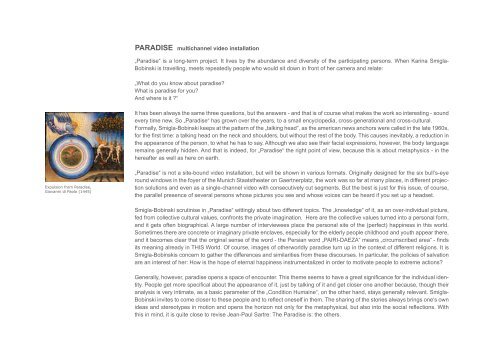Karina Smigla-Bobinski
Karina Smigla-Bobinski
Karina Smigla-Bobinski
You also want an ePaper? Increase the reach of your titles
YUMPU automatically turns print PDFs into web optimized ePapers that Google loves.
PARADISE multichannel video installation<br />
„Paradise“ is a long-term project. It lives by the abundance and diversity of the participating persons. When <strong>Karina</strong> <strong>Smigla</strong>-<br />
<strong>Bobinski</strong> is travelling, meets repeatedly people who would sit down in front of her camera and relate:<br />
„What do you know about paradise?<br />
What is paradise for you?<br />
And where is it ?“<br />
It has been always the same three questions, but the answers - and that is of course what makes the work so interesting - sound<br />
every time new. So „Paradise“ has grown over the years, to a small encyclopedia, cross-generational and cross-cultural.<br />
Formally, <strong>Smigla</strong>-<strong>Bobinski</strong> keeps at the pattern of the „talking head“, as the american news anchors were called in the late 1960s,<br />
for the first time: a talking head on the neck and shoulders, but without the rest of the body. This causes inevitably, a reduction in<br />
the appearance of the person, to what he has to say. Although we also see their facial expressions, however, the body language<br />
remains generally hidden. And that is indeed, for „Paradise“ the right point of view, because this is about metaphysics - in the<br />
hereafter as well as here on earth.<br />
Expulsion from Paradise,<br />
Giovanni di Paolo (1445)<br />
„Paradise“ is not a site-bound video installation, but will be shown in various formats. Originally designed for the six bull‘s-eye<br />
round windows in the foyer of the Munich Staatstheater on Gaertnerplatz, the work was so far at many places, in different projection<br />
solutions and even as a single-channel video with consecutively cut segments. But the best is just for this issue, of course,<br />
the parallel presence of several persons whose pictures you see and whose voices can be heard if you set up a headset.<br />
<strong>Smigla</strong>-<strong>Bobinski</strong> scrutinise in „Paradise“ wittingly about two different topics. The „knowledge“ of it, as an over-individual picture,<br />
fed from collective cultural values, confronts the private imagination. Here are the collective values turned into a personal form,<br />
and it gets often biographical. A large number of interviewees place the personal site of the (perfect) happiness in this world.<br />
Sometimes there are concrete or imaginary private enclaves, especially for the elderly people childhood and youth appear there,<br />
and it becomes clear that the original sense of the word - the Persian word „PAIRI-DAEZA“ means „circumscribed area“ - finds<br />
its meaning already in THIS World. Of course, images of otherworldly paradise turn up in the context of different religions. It is<br />
<strong>Smigla</strong>-<strong>Bobinski</strong>s concern to gather the differences and similarities from these discourses. In particular, the policies of salvation<br />
are an interest of her: How is the hope of eternal happiness instrumentalized in order to motivate people to extreme actions?<br />
Generally, however, paradise opens a space of encounter. This theme seems to have a great significance for the individual identity.<br />
People get more specifical about the appearance of it, just by talking of it and get closer one another because, though their<br />
analysis is very intimate, as a basic parameter of the „Condition Humaine“, on the other hand, stays generally relevant. <strong>Smigla</strong>-<br />
<strong>Bobinski</strong> invites to come closer to these people and to reflect oneself in them. The sharing of the stories always brings one‘s own<br />
ideas and stereotypes in motion and opens the horizon not only for the metaphysical, but also into the social reflections. With<br />
this in mind, it is quite close to revise Jean-Paul Sartre: The Paradise is: the others.


